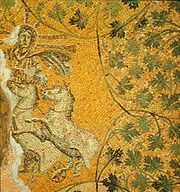- Mummer's Day
-
Mummer's Day, or "Darkie Day" as it is sometimes known, is an ancient Cornish midwinter celebration that occurs every year on Boxing Day and New Year's Day in Padstow, Cornwall. It was originally part of the pagan heritage of midwinter celebrations that were regularly celebrated all over Cornwall where people would guise dance and disguise themselves by blackening up their faces or wearing masks. It was in contrast to the 'white' summer festivals of Cornish towns such as Padstow, Helston and Penzance ( See 'Obby 'Oss festival). Recently the people of Penzance have revived its midwinter celebration with the Montol Festival which like Padstow at times would have had people darkening or painting their skin to disguise themselves as well as masking.
Contents
Darkie Parties
Throughout the 19th century especially in the east of Cornwall Darkie Parties were common Christmas celebrations held in Cornish homes and public houses. People would have performed traditional Cornish and other seasonal music and seasonal folk drama such as Mummers plays [1].
Controversy over Mummer's Day
While the original celebration had no connection with slaves, coal boats or black people some people have wrongly speculated that the event originated from freedoms being given to the occupants of passing slave ships which stopped in the port to allow slaves a bit of free time and space in the town. Padstow was known as the "free space." This is what is now celebrated with music and songs for all to enjoy. Once an unknown local charity event, the day has recently become controversial, perhaps since a description was published.[2] Also some now suggest it is racist for white people to "black up" for any reason.[3] Although some "outsiders" have linked the day with racism, Padstonians insist that this is not the case and deny both description and allegations.
1970s review
Long before the controversy Charlie Bate, noted Padstow folk advocate, recounted that in the 1970s the content and conduct of the day were carefully reviewed to avoid potential offence.[4] The Devon and Cornwall Constabulary have taken video evidence twice and concluded there were no grounds for prosecution.[5] Nonetheless protests resurface annually. The day has now been renamed Mummer's day in an attempt to avoid offence and identify it more clearly with established British tradition.[6] The debate has now been subject to academic scrutiny.[7] It is hoped that some of the more untraditional 'Minstrel songs that were incorporated in favour of traditional Cornish songs will soon be discontinued.[8],[9]
Minstrel songs
From the canon of Minstrel songs within the current practice it can be seen that they owe their origins to late 19th and early 20th century Jazz and the blacked up minstrel craze which ultimately created huge stars such as Al Jolson, in particular the works of American song writer Stephen Foster feature. Either as a result of confusion as to the real origins of disguise in the festival or as a way of introducing popular tunes, these songs became associated with the darkening and disguise practices of Padstow. The likely original tunes being the well preserved and still performed Padstow carols.
However, other researchers claim that Darkie Day and the spirituals sung by followers of Blue 'Oss in advance of Mayday originate in the groundswell of support for American black people that was extremely strong in areas of the UK where Methodism was predominant. Amongst other events, this led to the Manchester textile workers voting to refuse to make uniforms for the Confederate Army during the American Civil War. Minstrel songs and spirituals were performed to gain support for American black people, and the "blacking up" of traditional mumming adapted to show this support. What was seen as support in the 19th century has become somewhat offensive in the 21st.
See also
References
- ^ Courtney, M. A. (1890) Folklore and Legends of Cornwall
- ^ J. R. Daeschner, True Brits (Arrow, London, 2004)
- ^ "Way out West", The Guardian 3 January 2007
- ^ M. O'Connor, Ilow Kernow 3 (St Ervan, 2005) p27
- ^ "No action on town's 'Darkie Day'". BBC News. 10 March 2005. http://news.bbc.co.uk/1/hi/england/cornwall/4337475.stm. Retrieved 13 May 2010.
- ^ "MP calls for 'Darkie Day' to stop". BBC News. 11 January 2006. http://news.bbc.co.uk/1/hi/england/cornwall/4603886.stm. Retrieved 13 May 2010.
- ^ M. Davey, Guizing: Ancient Traditions and Modern Sensitivities, Philip Payton (ed), Cornish Studies 14 (Exeter, 2006) p229
- ^ Darkie Day
- ^ True Brits and Darkie Day
Culture of Cornwall Symbols 
Festivals AberFest · Allantide · Chewidden Thursday · Furry Dance · Golowan · Guldize · Kernewek Lowender · Montol Festival · Mummer's Day · Nickanan Night · Noze looan · 'Obby 'Oss · Picrous Day · St Piran's Day · Tom Bawcock's Eve
Sports Cuisine Arts Music Cornish bagpipes · Brenda Wootton · Gwenno Saunders · Fisherman's Friends
Folk songsLanguage Folklore Beast of Bodmin · Blunderbore · Bucca · Cruel Coppinger · Knocker · King Arthur · Lyonesse · Owlman · Piskie
Organisations Winter solstice and midwinter festivals Africa 
Americas Inti Raymi°: Peru, Bolivia, Ecuador (Inca†) • Jonkonnu°: Caribbean° (African American) • Soyal: US (Zuni, Hopi) • Wayeb': Guatemala° (Maya) • We Tripantu: Chile (Mapuche)Asia Amaterasu†: Japan • Choimus • Deygān, Maidyarem°: (Zoroastrian) • Dōngzhì, Tōji: (East Asian) • Lohri, Pongal, Makar Sankranti°: India(Hindu) • Sanghamitta Day: Sri Lanka (Buddhist) • Şeva Zistanê: (Kurdish) • Yalda: Iran (Persian)Europe Beiwe: (Saami) • Brumalia†: Ancient Greece • Christmas: Roman Empire° (Christian) • Dies Natalis Solis Invicti†: Roman Empire • Deuorius Riuri†: Gaul • Hogmanay°: Scotland • Karachun°: (West Slavs) • Mōdraniht†: Western Germany (Matres and Matrones) • Midvinterblót†: Sweden (Norse) • Montol Festival, Mummer's Day°: Cornwall (Celts) • Saturnalia†: Rome • Wren's Day°: Ireland, Isle of Man, Wales (Celts) • Yule, Jul°: (Germanic) • Ziemassvētki: Baltic (Romuva)† dagger indicates extinction. ° degree symbol indicates changes in date, name or location. ( ) indicate demographicCategories:- December observances
- Cornish culture
- Winter holidays
- Festivals in Cornwall
- Cornish nationalism
Wikimedia Foundation. 2010.
